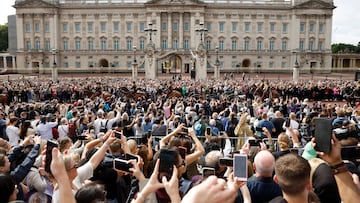How does the United Kingdom differ from England and Great Britain?
The UK’s complex history has seen the name of the sovereign state change multiple times over the years, but each term has its own specific meaning.

Around the world the names ‘England’, ‘Great Britain’ and the ‘United Kingdom’ are often used interchangeably, generally referring to the island found just above the tip of France.
However the death of Queen Elizabeth II, who reigned over the United Kingdom of Great Britain and Northern Ireland, has shone extra attention on the geographical quirk. In short, those three terms relate to three different but overlapping areas.
The sovereign state which is ruled by the monarch and prime minister is the United Kingdom (UK), which is comprised of four nations: England, Scotland, Wales and Northern Ireland. The four countries are controlled by a central government in London, but do have some devolved law-making powers, similar in this regard to the US’ states.
Related: Nostradamus predictions in 2022
England, UK or GB?
While England is a country, it is not a sovereign state. It does not sit at the United Nations and cannot create its own border policy, for example.
However it is by far the largest of the UK’s four composite countries, containing nearly 56 million of the UK’s 66 million inhabitants at last count. London, located in the south of England, is the national capital city and the home of the United Kingdom’s government.
For these reasons, England is often incorrectly used as shorthand for the United Kingdom, ignoring the involvement of Scotland, Wales and Northern Ireland. The UK is the only one of those terms that relates to a nation state with its own sovereign government.
And while the composite nations of the UK have their own legislative assemblies with devolved governments, ‘Great Britain’ has none of those powers. The name ‘Britain’ comes from the Roman word Britannia, which also gives the name to the Brittaney region of northern France.
There are competing arguments regarding the origins of the name ‘Great Britain’ but it is generally agreed to be a remnant of Roman occupation. Great Britain is not a country, but in fact a landmass.
The northern European island that houses England, Scotland and Wales; that’s Great Britain.
What is the history of the name ‘United Kingdom’?
Over the past 24 hours there has been a lot of mention of the UK’s thousand-year monarchy, which can be said to have begun around the year 925 with the unification of Anglo-Saxon tribes across modern day England.
The nations of England and Wales were united in 1536 when King Henry VIII enacted a bill that ensure that laws made in London applied to both countries. In 1707 the Kingdom of Scotland was added into the mix, along with England and Wales, to form the Kingdom of Great Britain.
In 1801 Ireland was conquered by the British and was added to the crown’s kingdom, forming the United Kingdom of Great Britain and Ireland. However the union was not to last and in 1922 the southern counties of Ireland broke away from the UK to form the Republic of Ireland, leaving only Northern Ireland. To this day, the monarch reigns over the United Kingdom of Great and Northern Ireland.






